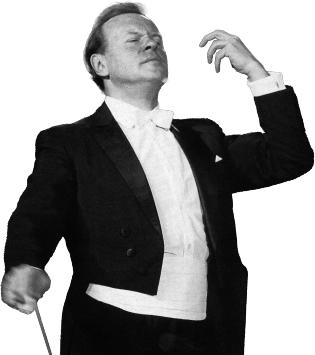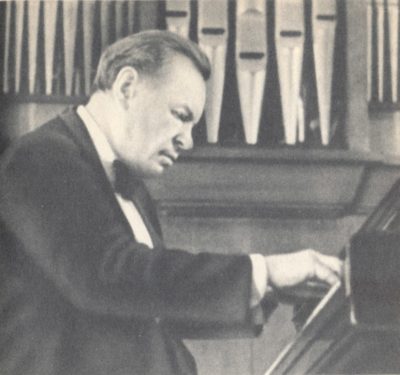Evgeny Svetlanov studied at the Gnessin School in the studio of Maria Alexandrovna Gurvich who had been a student of Nikolai Medtner. From his early years, she fostered an interest and love for Medtner’s music in the young Svetlanov and he carried this special love throughout his life. Not only did he worship Medtner’s music, but also took it upon himself to bring it to the people. This was particularly difficult in Russia at that time.
As an émigré, Medtner, as well as other distinguished composers and writers who had left the country, was almost outlawed. His music was next to impossible to obtain.
Ms. Gurvich created what could be called a cult of Medtner. I do not know whether she was indeed an outstanding disciple, but she certainly carried that aura. Maria Gurvich used to put on regular concerts dedicated to Medtner’s music. Having set a passionate goal of performing Medtner’s complete works in a series of recitals, Svetlanov was the main figure at these concerts. He presented complete piano sonatas, all short piano works, and excerpts from Medtner’s three piano concertos and complete vocal works. The vocal pieces were both played and sung, wonderfully so, by Svetlanov. He had inherited a very beautiful voice from his parents, professional opera singers.
Later in life Svetlanov would record two violin sonatas, three piano sonatas, three nocturnes for violin and piano, piano quintet, numerous short works for solo piano. Svetlanov’s playing at the Medtner concerts was exceptional, carrying the stamp of his personality even at this early stage. Integrity of form, long phrases, distinctive sound and a unique manner of approaching and realizing the music’s dramatic climaxes characterized these performances.
The audience at these concerts consisted of the people who took a serious interest in music. I attended all of them as well. I distinctly remember seeing Vera Kruglikova, one of Svetlanov’s aunts.
Vera Petrovna Kruglikova, his mother’s sister, an exceptionally educated person who knew literature and poetry and spoke fluent French, was one of the regular listeners at the concerts. She loved Svetlanov very much, and was very supportive of her nephew’s musical development. Svetlanov deeply respected and loved Vera Petrovna, went to her for advice, and showed her his early compositions. He was very proud of the fact that she and his mother were the nieces of the well known Russian music critic and literary scholar Kruglikov, who played an important role in the cultural life of Russia at the end of 19th century. Kruglikov studied music theory with Rimsky-Korsakov and they kept a life-long friendship. Svetlanov had amazing hands, remarkably suited to piano playing. They were not particularly large, but rather solid, something like Emil Gilels’ hands. The main characteristics of his playing was expediency and rigorous economy of movement: each motion was conceived to serve a musical idea.
Following Ms. Gurvich’s advice, Svetlanov took regular lessons for a couple of months from the teacher with a reputation of being a master of developing piano technique. Unfortunately, his name disappeared from my memory. This pedagogue gave him exercises which miraculously expanded his pianism. It is interesting that Svetlanov always retained this; sometimes he would not touch a piano for months, but after two days of playing these exercises his technique would instantly come back, better than before.
I always observed these studies, and remember the exercises very well, but back then I did not know who wrote them, and found out later that they were by Carl Tausig.
However, what was important was not what Svetlanov played, but how he played. He played virtually without lifting the fingers, thinking in terms of musical phrase, not pianistic texture. The link between his mental command and its realization at the keyboard was close to ideal. Svetlanov always had a clear concept about HOW a certain piece should sound.
An interesting story happened during one of his visits to New York. I decided to show him one of my most outstanding students, who played Rachmaninov’s Second Sonata. The young pianist had already accomplished a lot and gave a brilliant performance. I expected that Svetlanov would now exclaim “How beautiful, how wonderful!” Instead, he said that this was good for nothing, that everything was wrong, and that such music did not exist at all. The latter was regarding the edition by Horowitz, which he completely dismissed, saying that it was unnecessary, poor etc. But most importantly, he sat down at the piano. He played sections of the first movement, the beginning of the second, and a few other fragments. His playing, even after the performance of a young, very good pianist, was utterly convincing. It was full of imagery, relief; the quality of sound, its beauty, fullness, magnitude, the breath of the line — everything was absolutely unforgettable.
Svetlanov was also fascinated with opera. It started when he was 13 or 14, or probably even before that, since Svetlanov practically grew up at the Bolshoi Theater. His own operatic debut took place at the age of three, when he went on stage there as Cio-Cio San’s son in Puccini’s “Madame Butterfly”. When he was around 16, we would always go to the Moscow Conservatory’s opera studio, a wonderful small theater on Vakhtangov Street where performances were given by students of the conservatory. They sang with a genuine passion and expression. Our group of friends, two boys and two girls went to every single performance. At that time Svetlanov was fascinated with Rimsky-Korsakov’s operas. Two of them that were staged there were “Snow Maiden” and “The Tsar’s Bride”. Many years later Svetlanov told me that his favorite operas were “Snow Maiden” and, of course, “Pskovityanka” (“The Maid of Pskov”), which he chose for his conducting debut at the Bolshoi Theater, and which by the way, became his last production at the Bolshoi as well. I bring up the subject of opera because it related very closely to Svetlanov’s extremely accomplished pianism. I will never forget how he played operas on the piano and sang all the parts himself and his singing was so full of expression. His playing was so brilliant that one didn’t have to go to the theater.
At that time, those who heard him could see the qualities that later strongly developed in his conducting. His sight reading was perfect. Svetlanov was a passionate performer of chamber and symphonic repertoire. He had a beautiful operatic baritone. Svetlanov also loved voice chamber music. His knowledge of songs and arias was extensive.
Once he was introduced to Vera Alexandrovna Davydova, a star of the Bolshoi Theater. Not only did she play very important operatic roles, she also was keenly interested in art songs (not many opera singers were). I well remember Davydova’s and Svetlanov’s song recital in the Moscow Conservatory Hall, comprised entirely of the works of Yuri Alexandrovich Shaporin.
I would like to say a few words about Shaporin with whom Svetlanov studied composition. Shaporin wrote remarkable, beautiful Russian music. Besides, he was a very refined person, a true Russian intellectual, educated, with the knowledge of several languages. Shaporin knew the poet Alexander Blok and set a lot of his poetry to music. The piano parts for these songs are often extremely complex and difficult. I still remember the performance of “Zaklinaniye” (Incantantion). Davydova, who was a very beautiful woman, sang this exceptionally dramatic piece — based on the poem by Pushkin, with tremendous passion. My memory of this recital is still very vivid.
Svetlanov graduated from the Gnessin Institute as a pianist, going on to the Moscow Conservatory to study conducting and composition. During the graduation concert at the Institute, Heinrich Neuhaus was the head of the jury. Svetlanov’s playing impressed Neuhaus who invited him to continue his piano studies in his class. If I am not mistaken, Svetlanov had one piano lesson with Neuhaus. If I am wrong, then maybe two, but not more, as they didn’t seem to ‘click’. Svetlanov brought his favorite piece, “La Valse” by Ravel, to the first lesson, and played very well. I was present at that lesson. First of all, Neuhaus said he didn’t like this piece, and then made a couple of reluctant comments. In brief, it didn’t go well — Neuhaus was a complex person. But it was not that important, however, because Svetlanov played wonderfully anyway, and had a very active life as a pianist at that time. Svetlanov and I played an immense amount of symphonic literature together. I was his partner in this duo. We performed practically the entire Russian and a lot of Western symphonic music for four hands.
In the Soviet Union there was a convention that a new piece needed to be approved for public performance by a State Committee. There were many young composers in USSR; it’s many republics encouraged the development of local arts and music. All these composers wrote in orchestral scores. Few composers were sufficiently proficient at the piano to demonstrate the score for the Committee, a presentation that usually was on one or two pianos, for four hands. Our duo — Svetlanov and I — was in demand for these presentations. Soon, many composers asked us to perform their music before the Committee. Svetlanov himself transcribed the scores for piano. I remember seeing piles of those scores in our home. Everyone knew that a presentation given by our duo usually won a positive result with the Committee. Svetlanov’s art of piano playing was a remarkable phenomenon. Unfortunately, it remained unknown to many.


